|
|
|
Sort Order |
|
|
|
Items / Page
|
|
|
|
|
|
|
| Srl | Item |
| 1 |
ID:
130405
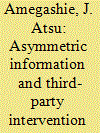

|
|
|
|
|
| Publication |
2014.
|
| Summary/Abstract |
I study a two-period model of conflict with two combatants and a third party who is an ally of one of the combatants. The third party is fully informed about the type of her ally but not about the type of her ally's enemy. In a signaling game, I find that if the third party is unable to give a sufficiently high assistance to her ally, then there exists a unique separating equilibrium in which the third party's expected intervention causes her ally's enemy to exert more effort than in the absence of third-party intervention; this worsens the conflict.
|
|
|
|
|
|
|
|
|
|
|
|
|
|
|
|
| 2 |
ID:
177667
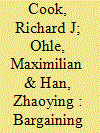

|
|
|
|
|
| Summary/Abstract |
Actors partially relinquish sovereignty in return for physical protection by a more powerful actor, generating a hierarchical relationship of a dominant, which supplies a political order, and subordinate(s), seeking the benefits that the political order can offer. This is the outcome of rationally assessing the respective situation, ultimately forgoing the presupposed paradigm that all actors are acknowledged as equal units in IR. The product of applying this hierarchical rubric to the Korean Peninsula offers a fundamental alternative for understanding how and why the current Korean Peninsula Nuclear Crisis unfolded in the manner that it did, while building upon relevant literature constituting the crux of hierarchy in international relations. What is presented are two political orders running parallel to one another: (1) the USA and the ROK and (2) China and the DPRK. Historically, both orders took fundamentally different tracks, as the USA and the ROK maintained a tight, valued and active social contract, while China and the DPRK periodically drifted into loose, devalued and inactive phases. Additionally, a paradigm has emerged following China’s inclusive behavior post-1978, the USA’s unipolar moment, and Washington’s aggressive signaling and actions, forcing the DPRK to reconsider its dominant’s reliability as a credible security guarantor. Having witnessed these seismic shifts, the DPRK has intensified its development of ‘the ultimate security guarantor’, leading to the contemporary crisis we are facing today.
|
|
|
|
|
|
|
|
|
|
|
|
|
|
|
|
| 3 |
ID:
188891
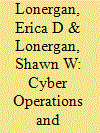

|
|
|
|
|
| Summary/Abstract |
In response to our article, “Cyber Operations, Accommodative Signaling, and the De-Escalation of International Crises,” we are delighted to engage with three scholars: Brandon K. Yoder, Fiona S. Cunningham, and Michael P. Fischerkeller. By way of background, this project grew out of our prior research on cyber operations’ limitations for coercion and the paucity of evidence that cyber operations cause escalation.Footnote1 Our inherent intuition was that cyber operations may be useful for conveying an aversion to significantly escalate disputes for some of the same reasons they are poor tools of coercion—and that this could help account for the relatively robust empirical finding that cyber operations are not associated with crisis escalation.Footnote2 Therefore, one part of our argument rests on cyber operations’ relatively limited effects compared to other tools at a state’s disposal.
|
|
|
|
|
|
|
|
|
|
|
|
|
|
|
|
| 4 |
ID:
174130
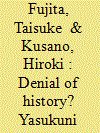

|
|
|
|
|
| Summary/Abstract |
Under what conditions would Japanese leaders visit the controversial Yasukuni Shrine and why? Previous studies have focused primarily on the domestic benefits and effects of such visits, claiming that leaders employ visits to follow their own conservative ideology and gain domestic political support. Given the harsh international criticism that tends to ensue, however, political leaders should also consider the cost and international effects of such visits. This study proposes three necessary conditions for such visits: a conservative ruling party, a government enjoying high popularity, and Japan's perception of a Chinese threat. With regard to the latter, a security threat from China has allowed Japan to use these visits as a credible signal of its resolve against China. Comparative analyses of Japanese cabinets after the mid-1980s support this argument.
|
|
|
|
|
|
|
|
|
|
|
|
|
|
|
|
| 5 |
ID:
133643
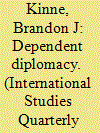

|
|
|
|
|
| Publication |
2014.
|
| Summary/Abstract |
Diplomatic recognition is an essential tool of statecraft but remains largely unanalyzed by political scientists. Two recent trends in diplomatic practice raise notable puzzles: (i) use of diplomatic ties to signal (dis)approval of a regime or its policies, based largely on cues from diplomatic partners, and (ii) reliance on diplomatic missions as a means of securing prestige in the international system. I argue that both trends are the result of network influences. States face resource constraints and must choose diplomatic partners wisely, but they lack complete information about the risks and benefits of extending diplomatic recognition. To solve this informational dilemma, they condition recognition on the diplomatic activity of others. First, states send missions to countries that host missions from their own diplomatic partners, which increases the strength of diplomatic signals and reduces political risks. Second, states send missions to countries that host large numbers of missions in general (that is, "prestigious" countries), which increases their capacity for information gathering. In general, a state's decision to extend or retract diplomatic recognition depends heavily on the decisions of other states. Employing novel network methodologies, I show that these endogenous network influences are among the most consistent and substantively powerful determinants of diplomatic recognition.
|
|
|
|
|
|
|
|
|
|
|
|
|
|
|
|
| 6 |
ID:
183145
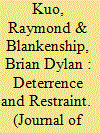

|
|
|
|
|
| Summary/Abstract |
Multinational military exercises are among the most notable demonstrations of military cooperation and intent. On average, one is initiated every 8.9 days. But it has often been argued that joint military exercises (JMEs) increase the risk of war. Using a relational contracting approach, we claim that formal military alliances mediate the effect of JMEs. Exercises and alliances serve complementary functions: The former allows targeted responses to military provocations by adversaries, while the latter provides institutional constraints on partners and establishes a partnership’s overall strategic limitations. In combination, alliances dampen the conflict escalation effects of exercises, deterring adversaries while simultaneously restraining partners. We test this theory using a two-stage model on directed dyadic data of JMEs from 1973 through 2003. We find that JMEs in general do not escalate conflict, and that JMEs conducted with allies in particular reduce the probability of conflict escalation.
|
|
|
|
|
|
|
|
|
|
|
|
|
|
|
|
| 7 |
ID:
121731
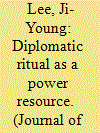

|
|
|
|
|
| Publication |
2013.
|
| Summary/Abstract |
What explains Korea's success in surviving as an independent state for over 2,000 years, not annexed to China, when it shares a border with this powerful imperial neighbor? I argue that diplomatic ritual can be conducive to managing asymmetric power relations and that the Korean state and the Chinese state prior to the nineteenth century used the diplomatic ritual of investiture in a strategic manner as a signaling mechanism to manage the expectations of each side. Drawing insights from ritual studies, I offer three specific mechanisms: (1) regularity and precision, (2) strategic ambiguity, and (3) the manipulation of symbols, through which the ritualization of power relations reduces the tension arising from the disparity in power. The empirical evidence comes from an investigation of a total of sixteen investiture cases between Choso n Korea and Ming China between 1392 and 1644. It shows that the granting and seeking of investiture on both sides was not only a way of signaling their commitment to the status quo, but also a medium of negative soft power through which the stronger side could change the status quo relations to its favor using the symbolic power embedded in the investiture ritual.
|
|
|
|
|
|
|
|
|
|
|
|
|
|
|
|
| 8 |
ID:
112748
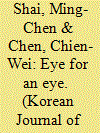

|
|
|
|
|
| Publication |
2012.
|
| Summary/Abstract |
Although signaling is the essence of diplomacy, it has often been overlooked in
previous studies on international crises. In fact, whether states in a dyad escalate
disputes to the brink of war or seek conflict resolution, both sides of a crisis use
these forms of signaling to convey their intended messages and possible responses.
However, in most of these dyadic international conflicts, the patterns of signaling
motives are not identified. In this article, it is argued that signaling decisions
depend on the interaction of contextual dimensions, perceived threats, and the
status disparity facing the states in a dyad. By analyzing both the signaling and
the counter-signaling of nations in dyadic interactions, an alternative insight is
offered into why the Korean War turned out to be inevitable.
|
|
|
|
|
|
|
|
|
|
|
|
|
|
|
|
| 9 |
ID:
175736


|
|
|
|
|
| Summary/Abstract |
This article builds a new theoretical framework to understand the role of threats in terrorism. Interviews of IRA members give rise to a speech/kinetic action model of terrorism, in which threats and violence jointly determine the physical consequences and political messages conveyed by terrorist attacks. In fact, threats are integral to the attack, and some attacks can be said to consist of threats alone. IRA interviews reveal four varieties of threats: warnings, hoaxes, pledges, and bluffs. These categories are distinguished by the timing of the threatened violence (immediate or prospective) and the intended truthfulness of the threat. The IRA interviews establish the function of each type of threat in influencing the beliefs or behavior of state and society. Threats may disrupt the economy, increase or decrease bloodshed, control social behavior, secure tactical or strategic advantage, claim attacks, aggrandize the perpetrator, and facilitate bargaining. A single threat may serve several of these functions, signaling different messages to different audiences. In fact, this is one of the most important applications of threats. When violence alone would produce suboptimal outcomes, threats alter the pattern of damage in a way that optimizes militants’ messaging for all audiences.
|
|
|
|
|
|
|
|
|
|
|
|
|
|
|
|
| 10 |
ID:
161766


|
|
|
|
|
| Summary/Abstract |
This paper studies signaling behaviors in marital matching. As some of males' essential traits for marriage are hardly observable, a high-quality male is motivated to signal. This paper applies a modified Spence signaling model to the marriage market and tests the theoretical implications with survey data from rural China. We find that houses are primary signals in marriage markets in China, which explains both the high homeownership and the large housing sizes. We find 1) marriageable males are twice as much likely to build a house five years before marriage than five years after, while females do not behave the same way, 2) housing size is reflective of males' unobservable characteristics, especially in villages with high interest rates. Males with more social connections, higher income rank and greater wealth build larger houses. And 3) a ten-square-meter larger house reduces a male's probability of singlehood by 0.8% at the age of 30, and enables him to marry a wife 0.1 cm taller.
|
|
|
|
|
|
|
|
|
|
|
|
|
|
|
|
| 11 |
ID:
165999
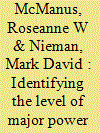

|
|
|
|
|
| Summary/Abstract |
Major powers signal support for protégés in order to reassure them and deter harm against them. Yet, it is not always clear how to identify who a major power’s protégés are or the degree of support signaled. Major powers have a variety of complementary signals to choose among, including alliances, arms transfers, joint military exercises, and others. It can be difficult to weigh the importance of individual signals, especially since different major powers do not deploy each signal in the same way. We address this challenge using a Bayesian latent measurement model, which provides a theoretically coherent means of identifying the overall level of support signaled by a major power for a protégé. Our approach yields a cross-sectional time-series dataset, providing a continuous measure of the degree of support signaled by major powers for all minor powers from 1950 to 2012. Our model also provides insights regarding which signals of support are most informative when sent by each major power. We find considerable variation among major powers regarding which of their signals are most meaningful, but in general alliances and military exercises tend to be among the most important signals. In further applications using our latent measure, we also assess under which conditions major powers are likely to increase their signals of support for protégés, as well as predict whether a major power will intervene in conflicts involving its protégés.
|
|
|
|
|
|
|
|
|
|
|
|
|
|
|
|
| 12 |
ID:
166000
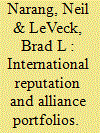

|
|
|
|
|
| Summary/Abstract |
Why do states ever form military alliances with unreliable partners? States sign offensive and defensive military alliances to increase their fighting capabilities in the event of war and as a signal to deter potential aggressors from initiating a crisis. Yet, signing an alliance with an unreliable partner is at odds with both of these rationales. This should be particularly concerning for peace scholars and policymakers, since the uncertainty generated by unreliable partners may increase system-wide conflict. This article provides an answer to this puzzle by arguing that states continue to form alliances with unreliable partners because they can adopt rational portfolio-diversification strategies. Drawing on well-developed models from portfolio theory, we present evidence that states design their overall alliance portfolios to minimize the risks posed by allies with a reputation for being unreliable. Specifically, we show that unreliable allies are more likely to be pooled into multilateral alliances that dilute risk rather than bilateral alliances, and that states allied with unreliable partners form a greater number of alliances to hedge against the added risk of default. Together, our results demonstrate why unreliable partners may not lead to increased conflict initiation, while also providing a novel explanation for previously unexplained variation in the structure of alliance portfolios. The article contributes to the literatures on international reputation and the rational design of international institutions by demonstrating how international reputation matters in subtle and often overlooked ways.
|
|
|
|
|
|
|
|
|
|
|
|
|
|
|
|
| 13 |
ID:
082923


|
|
|
|
|
| Publication |
2008.
|
| Summary/Abstract |
This article offers a novel contribution to the terrorism literature by using mathematical modeling and case studies to demonstrate how terrorist and extremist groups can utilize social service provision activities and anti-corruption campaigns instead of violent activities to gain support.The basic argument of the model is that terrorist groups will try to gain support by promising that they will be better distributors of resources than the current regime once they gain power and by promising that they will be less corrupt. However, because all organizations can freely make these promises, their words are cheap talk, and the general population should ignore them. To overcome this problem, organizations must offer a costly signal. Provision of social goods and implementation of explicit anti-corruption campaigns before taking power serves as such a signal. As the United States government and its allies widen their "war on terrorism," they must consider the ramifications of social service provision and anti-corruption activities, which are common, effective, and potentially useful for increasing the probability of group success.
|
|
|
|
|
|
|
|
|
|
|
|
|
|
|
|
| 14 |
ID:
185984
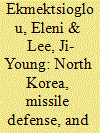

|
|
|
|
|
| Summary/Abstract |
This article examines the relationship between US missile defense and the US-China security dilemma dynamics by developing the concept of diffuse signaling involving the Korean peninsula. We argue that the US’ efforts to bolster deterrence against North Korea’s growing threats through missile defense have resulted in China’s countermeasures of enhancing survivability and penetrability of its second-strike capability, leading to downward spirals of tensions between Beijing and Washington. We explain how three structural factors – geography, the US alliance system, and nuclear asymmetry – have made diffuse signaling salient, thus making it very challenging for the United States to reassure China even when its actions targeted North Korea. The article empirically shows the action-reaction process through which China and the US have come to experience the aggravation of the security dilemma over the Korean peninsula.
|
|
|
|
|
|
|
|
|
|
|
|
|
|
|
|
| 15 |
ID:
172141
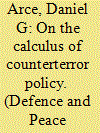

|
|
|
|
|
| Summary/Abstract |
In democratic societies, elections can act as a referendum on politicians’ counterterror policy. At the same time, counterterror policy is conducted under conditions of asymmetric information because the government is better informed about the nature of the threat than is the public. Using a hybrid signaling model, this paper characterizes counterterror policy in terms of its instrumental efficacy against terrorists, and also non-instrumental considerations such as the electoral consequences of policy failures. In addition, the equilibria capture the difficulties that voters have in assessing the appropriateness of policy in the absence of terrorism.
|
|
|
|
|
|
|
|
|
|
|
|
|
|
|
|
| 16 |
ID:
168281
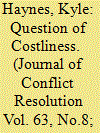

|
|
|
|
|
| Summary/Abstract |
This article examines how interstate signaling processes operate under multiple dimensions of uncertainty. The existing signaling literature largely assumes that states communicate and infer one another’s intentions in a simplified context where they are only uncertain about one component of the other’s preferences. Relaxing this unrealistic assumption, I develop a model of interstate reassurance in which the receiver is uncertain of both the compatibility of the sender’s goals and its time horizons. If a receiving state is unsure of the sending state’s time horizons, it is more difficult to determine the costliness of a given signal, and thus how credible it is as an indicator of the sender’s preferences. I show that under certain conditions, shorter time horizons lead to more credible signaling as states become less willing to incur the short-term costs of misrepresentation. Under other conditions, however, shortened time horizons can incentivize hedging behavior, thus undermining a benign state’s ability to credibly signal its intentions. Finally, the model reveals that multidimensional uncertainty can actually facilitate cooperation across a wider range of conditions than one-dimensional uncertainty. I present two brief case illustrations and discuss the model’s implications for contemporary US–China relations.
|
|
|
|
|
|
|
|
|
|
|
|
|
|
|
|
| 17 |
ID:
179163


|
|
|
|
|
| Summary/Abstract |
A wave of recent scholarship has breathed new life into the study of reputation and credibility in international politics. In this review article, the authors welcome this development while offering a framework for evaluating collective progress, a series of related critiques, and a set of suggestions for future research. The article details how the books under review represent an important step toward consensus on the importance of reputation in world politics, elucidating scope conditions for when reputational inferences are likely to be most salient. The authors argue that despite the significant accomplishments of recent studies, the scholarly record remains thin on the psychology of the perceiver and is instead focused on situational factors at the expense of dispositional variables and is rather myopically oriented toward reputation for resolve to the exclusion of other important types. Despite its contributions, the new literature still falls short of a full explanation for how actors draw inferences about reputation. These remaining theoretical challenges demand scholarly attention and suggest a role for psychology in filling some of the gaps.
|
|
|
|
|
|
|
|
|
|
|
|
|
|
|
|
| 18 |
ID:
157900
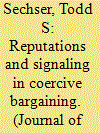

|
|
|
|
|
| Summary/Abstract |
When do states defend their reputations? States sometimes pay high costs to protect their reputations, but other times willingly tarnish them. What accounts for the difference? This article investigates reputation building in the context of coercive diplomacy. In coercive bargaining, giving in to a challenge can harm one’s reputation. I argue, however, that states value their reputations less—and therefore are more willing to capitulate to coercive threats—when they do not expect future challenges. Using a data set of more than 200 coercive threats, empirical tests find support for this logic. Coercers that are constrained in their ability to initiate future challenges exhibit higher rates of coercive success in the status quo. The results shed light on the causes of reputation-building behavior and add an important element to our understanding of the dynamics of coercive diplomacy.
|
|
|
|
|
|
|
|
|
|
|
|
|
|
|
|
| 19 |
ID:
172309


|
|
|
|
|
| Summary/Abstract |
This essay raises the question whether citizens in the digital age can learn from how credibility is treated in international negotiations. Negotiators face problems both in attempting to send credible signals and in making credibility assessments of received signals. Several studies, starting with Schelling’s seminal analysis of commitments, indicate that credible signals are those that are somehow costly to the sender. Contributions to our understanding of how recipients make credibility assessments include Jervis’s distinction between signals (with no inherent credibility) and indices (believed to be untainted by deception). The most general conclusion emerging from existing research is that there is no definitive, infallible solution to the problem of credibility, insofar as deception and misperception are intrinsic to all signaling systems. Today’s unfortunate combination of limited awareness of credibility problems, on the one hand, and technological advances facilitating deception, on the other, calls for intensified education as well as multidisciplinary research.
|
|
|
|
|
|
|
|
|
|
|
|
|
|
|
|
| 20 |
ID:
186818
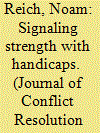

|
|
|
|
|
| Summary/Abstract |
In the presence of incomplete information, strong states have an incentive to invest in costly signals that can differentiate them from weaker states. I argue that states can signal strength by handicapping themselves, deliberately reducing their combat effectiveness. In an ultimatum crisis bargaining model, I show that strong states can reduce the risk of war by making themselves weaker without reducing their demands. The key to this result is a comparative advantage that allows stronger types to fight more effectively with handicaps. This allows for an equilibrium where (1) stronger states adopt larger handicaps, thereby revealing their strength to the receiver, (2) larger handicaps are more likely to deter the receiver, and, (3) the positive risk of war precludes weaker types from imitating handicap signals. The ability to reveal strength peacefully has important ramifications for theories of mutual optimism, war termination, and the relationship between parity and war incidence.
|
|
|
|
|
|
|
|
|
|
|
|
|
|
|
|
|
|
|
|
|